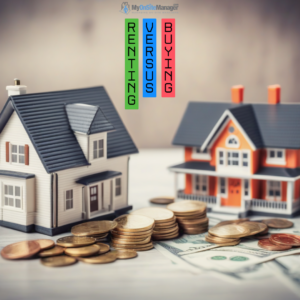In today’s real estate landscape, the question of whether to rent or buy a home has become more pressing than ever. The financial disparity between renting and owning is widening, leaving many potential homeowners wondering if buying a home is worth the investment. According to recent data, renting is now significantly more affordable than buying in all 50 major metropolitan areas across the United States.
The Current Cost Disparity
Renting a single-family home is, on average, 30% cheaper than buying. The median asking rent stands at $1,720, while the median listing price for a home is $425,950. This translates to an estimated monthly mortgage payment of $2,229—significantly higher than the cost of renting. This shift is driven by elevated home prices and mortgage rates, which currently hover around 6.93%, making it more difficult for many to afford the costs associated with homeownership.
The Benefits of Renting
Renting offers more than just a lower monthly cost—it comes with additional advantages:
- Lower Financial Commitment: Renters are not responsible for property taxes, homeowners insurance, or major repairs, which can quickly add up for homeowners. Estimates suggest that homeowners can spend 1% to 4% of their home’s value annually on maintenance alone.
- Flexibility and Mobility: For those uncertain about their long-term plans, renting provides the freedom to relocate without the challenges of selling a property. This flexibility is particularly appealing to younger professionals or those in transitional phases of life.
- No Market Risk: Renters are insulated from potential downturns in the housing market, ensuring they aren’t tied to a property that could lose value.
The Benefits of Buying
While renting may offer immediate savings, buying a home can provide long-term financial and personal rewards:
- Equity and Wealth Building: Each mortgage payment contributes to building equity in the property, essentially acting as a form of forced savings. Over time, homeowners can tap into this equity for future financial needs or as an investment.
- Stability and Predictability: Homeownership ensures fixed monthly payments for those with a fixed-rate mortgage, protecting against unpredictable rent hikes. This stability can be particularly valuable for families looking to settle in a specific community.
- Personalization and Control: Unlike renters, homeowners have the freedom to modify and personalize their living spaces to suit their preferences.
Key Considerations for Buyers
Despite the potential benefits, purchasing a home requires careful planning. Homeownership entails additional expenses such as closing costs, property taxes, homeowners insurance, and routine maintenance. Prospective buyers must also account for fluctuating interest rates, which can significantly impact monthly mortgage payments.
Additionally, buyers should evaluate how long they plan to stay in the home. Generally, buying is more advantageous for those who plan to live in a property for at least five to seven years, as this allows time to build equity and offset the upfront costs of buying.
Tools and Resources
For those grappling with the decision, tools like the Rent vs. Buy Calculator can provide clarity by comparing the total costs of each option over a specified period. Seeking advice from financial advisors or real estate professionals can also help tailor the decision to individual circumstances.
Conclusion
The choice between renting and buying is deeply personal, influenced by financial health, lifestyle preferences, and long-term goals. While renting may currently be the more affordable option, homeownership remains a cornerstone of the American Dream for those prepared for the commitment. By weighing the costs and benefits and considering both short-term needs and long-term aspirations, individuals can make the choice that best aligns with their circumstances.
Source: Here’s how much more a single-family home costs to buy than rent

